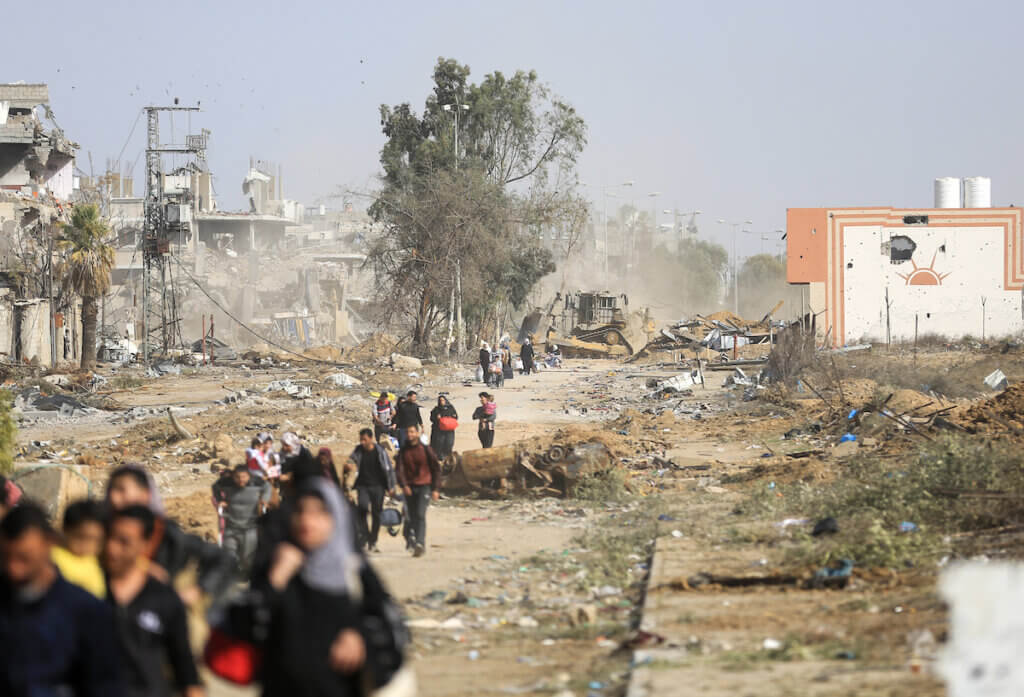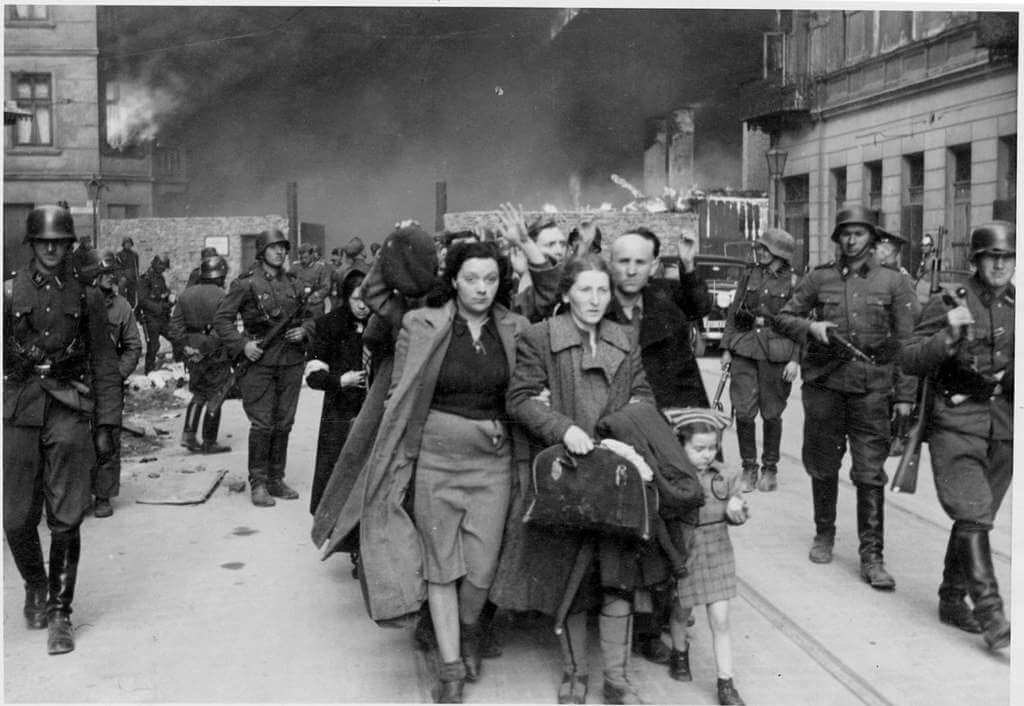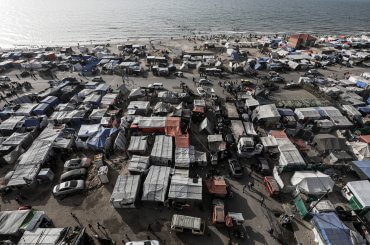Comparisons are not about exact identities. One can always level criticism at a comparison and claim that it is imperfect. But such a judgement is inherently flawed, since comparisons are not intended to mark identity, but to underscore some shared features — critical features, to be sure, not incidental or ancillary ones.
To compare the Jewish Ghetto under Nazism with the Gaza ghetto may be profoundly disturbing; but should we look away from that similitude to avert our gaze from the horror that is unfolding now, and which, according to several expert commentators, is unprecedented in modern history? Consider the enormity and the speed with which the slaughter of innocent civilians is now taking place. Beyond the horrendous killings achieved through relentless airstrikes there is the premeditated act of depriving a besieged population of its basic necessities: food, fuel, medicine and water. There is the humiliation of both old and young men, stripped virtually naked and executed extra-judicially. Are these intentional acts of genocide not reminiscent of Nazism? Gaza, as some have called it, is not a concentration camp anymore; it is an extermination camp.
A comparison of the Gaza ghetto with the Jewish ghetto under Nazism may well spawn a debate about distinct genocidal agendas. But that discussion digresses from the central point. Differences and variations aside, what unites all manner of genocides is their unfathomable cruelty, their dizzying inhumanity. So aberrant are these acts of annihilation that they defy language. Speech and reason are stymied, disabled, and paralyzed by the apocalyptic character of this mass erasure of humankind.

It is natural to want to avert one’s eyes from all this – (and by “this” I mean all that is too obscene and repugnant to ponder for more than a fleeting moment.) But the discomfiture in this “sacrilegious” comparison pales beside the agony of the current victims – the besieged Palestinians. Their agony won’t disappear just because we turn our gaze away and refuse to confront the comparison. Might the discomfort arising from the comparison be lessened if it meant that articulating it publicly and forcefully could yield hope, could help stop the carnage and pre-empt a full-blown genocide?
I would argue that there is significant political and moral value in reinforcing the comparison, for the visceral pang that such an analogy provokes can become a salutary form of self-questioning in the otherwise conflicted, complacent, or indifferent public. The shock effect resulting from this comparison has the power to jolt that public out of its complacency, denial, and sheer sense of hopelessness. Indeed, to recall the threshold of “the unspeakable,” which marked the Holocaust of the Jews, and to draw a line from that 20th-century episode to the present is to remind the world that the war on today’s Gazans (and, indeed, on Palestinians in the West Bank) has reached that awful threshold of victimhood precipitated by Nazi violence. For years, this threshold has conjured an idea of absolute victimhood exclusive to Jews. No longer. The horror of the past has returned in a new guise; the Ur victim is not the Jew, but the Palestinian.
If we are to underscore the gravity of the current crisis, we have to invest it with urgency. The disturbing comparison, which I have articulated in the above, can potentially galvanize the general public into action, into political speech and effective protest. Not to make the comparison is to allow the apocalyptic landscape of Gaza and the slaughter to worsen. For some (notably Israel’s apologists) might say: it’s not as bad as Auschwitz so we can afford (at least morally) to continue bombing the hell out of the strip.
Political value is not the only merit in underscoring this disturbing comparison. The unsettling analogy is also a crucial means of exploding long-held myths: in other words, that Jewish victimhood is beyond compare, exalted and singular in its gravity. Indeed, it is precisely the exceptionalism with which Israel envelops itself that has allowed the Zionist political elite (wherever it may be – in the US, UK, Europe, or Israel) to flout international law repeatedly for more than 75 years. It is this cultivated sense of transcendent sublimity (arising from the weaponization of the Holocaust and the manipulative use of the Bible) that elevates Israel’s status to an arrogant actor on the world stage, one that is indifferent to all red lines (that is, to virtually all Geneva conventions and UN resolutions).
With this self-assigned supra-human identity, Israel’s expansionism and its slaughter of innocent Palestinians are buttressed by a sense of God-given limitless power. The death of more than 21,000 Palestinians does not sate Israel’s vindictive appetite for revenge in response to October 7. For Israel, UN resolutions belong to “mere” world affairs; and so it spurns these as paltry, couching its claims in the language of divine authority. With this supercilious rhetorical posture, it scoffs at the moral judgment and criticism leveled at it by others. It repudiates international law with brazen insouciance because it knows that, with U.S. backing, it can transgress reason and law with infinite impunity. Once pitied as the collective victim of genocide, Israel is now the perpetrator, the state that, paradoxically, wields victimhood as its quintessential raison d’être.
If we are to hold Israel to account for its crimes, we must exercise the democratic right to say openly and unabashedly that Jews have no monopoly over genocide-driven victimhood. Jews are not the eternal victims of history. Conversely, progressive Jews have a moral duty to help loosen the Zionist grip over that sense of singular victimhood. The latter is a self-assigned prerogative that enables Israel (together with its supporters) to exploit such a privilege with disastrous — genocidal — consequences. It is imperative that we help bring that carnage to a full stop.
The comparison of the Jewish ghetto under Nazism with the Gaza ghetto under Israel’s (current) fascistic authority must cease to be sacrilegious. In fact, it is essential that the comparison, however uncomfortable, be voiced openly, if only to force Israel and its apologists to see the “Jewish” state’s reflection in the mirror of the Nazi past, and, hopefully, to ponder with revulsion its own fascistic reality. If this could happen, it would mark a significant turning point in history.



I just heard a United Church of Canada minister, reporting on his trip to Palestine/Israel, say that Christian families in Gaza are splitting up, some going to a Catholic church and some to an Orthodox church, hoping that only one will be bombed and that some of the family will survive.
Masha Gessen said that she knew that what would raise hackles in “In the Shadow of the Holocaust” was her comparison of Gaza to the ghettos. Not the original one in Venice, or the ones in Harlem etc., but under the Nazis. It did. But when I read it, I thought, Of course. Obviously true.
CHOMSKY: ‘…for fifty years, Israel has been explicitly trying to use the Holocaust as a propaganda weapon to justify crushing the Palestinians, occupying Palestinian territory illegally, practically destroying Gaza, [it’s] almost unlivable now, a million children can’t even get potable water, constant atrocities in the West Bank… they think they can get away with this as long as they can wave “the Holocaust” in front of people’s eyes…’
https://youtu.be/dp-m_c2buA8?si=yxXTWvyQ3ZwMCBFU [2022 interview…]
Quit Apologizing!
Robert R Wilson, who was a Quaker, said it was to his profound regret that he did not walk out when Germany surrendered. Hans Bethe, who was a Lutheran, but had a Jewish mom, said “he never thought about it” to his profound regret. and Feynman asked Wilson, “why are you so depressed Bob?” to which Wilson replied, it is an awful thing we have done.
It happened and is part of history now and can not, not even with Israeli PR, be changed.
But it ironic I must admit.
Here’s the analogy: Like the brave ghetto fighters who confronted the Nazis, the brave kibbutzniks, out-numbered and out-gunned on Oct.7, came out to confront the genocidal terrorists, to defend their families and communities and homes.